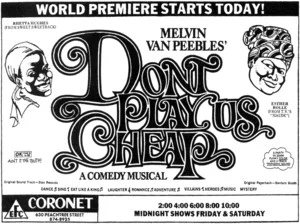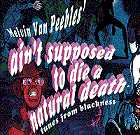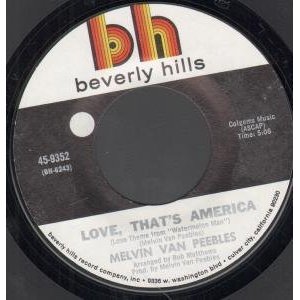Related Research Articles

Melvin Van Peebles was an American actor, filmmaker, writer, and composer. He worked as an active filmmaker into the early 2020s. His feature film debut, The Story of a Three-Day Pass (1967), was based on his own French-language novel La Permission and was shot in France, as it was difficult for a black American director to get work at the time. The film won an award at the San Francisco International Film Festival which gained him the interest of Hollywood studios, leading to his American feature debut Watermelon Man, in 1970. Eschewing further overtures from Hollywood, he used the successes he had so far to bankroll his work as an independent filmmaker.

Mario Van Peebles is an American film director and actor best known for appearing in Heartbreak Ridge in 1986 and known for directing and starring in New Jack City in 1991 and USS Indianapolis: Men of Courage in 2016. He is the son of actor and filmmaker Melvin Van Peebles, whom he portrayed in the 2003 biopic Baadasssss!, which he also co-wrote and directed.

Sweet Sweetback's Baadasssss Song is a 1971 American independent blaxploitation action thriller film written, co-produced, scored, edited, directed by, and starring Melvin Van Peebles. His son Mario Van Peebles also appears in a small role, playing the title character as a young boy. The film tells the picaresque story of a poor black man fleeing from the white police authorities.
Baadasssss! is a 2003 American biographical drama film, written, produced, directed by, and starring Mario Van Peebles. The film is based on the struggles of Van Peebles' father Melvin Van Peebles, as he attempts to film and distribute Sweet Sweetback's Baadasssss Song, a film that was widely credited with showing Hollywood that a viable African-American audience existed, and thus influencing the creation of the blaxploitation genre. The film also stars Joy Bryant, Nia Long, Ossie Davis, Paul Rodriguez, Rainn Wilson, and Terry Crews.

Rappin' is a 1985 American film directed by Joel Silberg, written by Adam Friedman and Robert J. Litz, produced by Menahem Golan and Yoram Globus and starring Mario Van Peebles. The film is a sequel to Breakin' 2: Electric Boogaloo, and is also known as Breakdance 3. Although it features Ice-T, Rappin' has a plot unconnected to the previous two films and features different lead characters and locations. It is also considered to be a companion piece to the documentary Breakin' 'n' Enterin'.

Watermelon Man is a 1970 American comedy film directed by Melvin Van Peebles and starring Godfrey Cambridge, Estelle Parsons, Howard Caine, D'Urville Martin, Kay Kimberley, Mantan Moreland, and Erin Moran. Written by Herman Raucher, it tells the story of an extremely bigoted 1960s-era white insurance salesman named Jeff Gerber, who wakes up one morning to find that he has become black. The premise for the film was inspired by Franz Kafka's Metamorphosis, and by John Howard Griffin's autobiographical Black Like Me.

Don't Play Us Cheap is a 1973 American musical comedy film based on the 1970 musical of the same name. The musical was written, produced, scored, edited and directed by Melvin Van Peebles. Both the original stage musical and the film adaptation are based on Van Peebles' 1967 French-language novel La fête à Harlem (1967).

Identity Crisis is a 1989 comedy film directed by Melvin Van Peebles. Written by Mario Van Peebles, the film is about a rapper who winds up sharing his body with the soul of a dead fashion designer, switching between personalities every time he is struck on the head.

The Ethel Barrymore Theatre is a Broadway theater at 243 West 47th Street in the Theater District of Midtown Manhattan in New York City. Opened in 1928, it was designed by Herbert J. Krapp in the Elizabethan, Mediterranean, and Adam styles for the Shubert family. The theater, named in honor of actress Ethel Barrymore, has 1,058 seats and is operated by the Shubert Organization. Both the facade and the auditorium interior are New York City landmarks.

The Booth Theatre is a Broadway theater at 222 West 45th Street in the Theater District of Midtown Manhattan in New York City. Opened in 1913, the theater was designed by Henry Beaumont Herts in the Italian Renaissance style and was built for the Shubert brothers. The venue was originally operated by Winthrop Ames, who named it for 19th-century American actor Edwin Booth. It has 800 seats across two levels and is operated by The Shubert Organization. The facade and parts of the interior are New York City landmarks.

Ghetto Gothic is the fifth studio album by Melvin Van Peebles. Released in 1995, this album marks the second traditional music effort by Van Peebles, after What the....You Mean I Can't Sing?! Previously, Van Peebles released the experimental spoken word albums Brer Soul, Ain't Supposed To Die a Natural Death and As Serious as a Heart-Attack.
The Roundabout Theatre Company is a non-profit theatre company based in Midtown Manhattan, New York City, affiliated with the League of Resident Theatres.

Living My Life is the sixth studio album by Grace Jones, released in 1982. It was the last of three albums she recorded at the Compass Point Studios in the Bahamas.

Ain't Supposed to Die a Natural Death (Tunes from Blackness) is a musical with a book, music, and lyrics by Melvin Van Peebles. The musical contains some material also on three of Van Peebles' albums, Brer Soul, Ain't Supposed to Die a Natural Death and As Serious as a Heart-Attack, some of which were yet to come out.
The Waltz of the Toreadors is a 1951 play by Jean Anouilh.

"The Apple Stretching" is a song by American recording artist Grace Jones, released as a single in 1982.

ConfessionsOfa Ex-Doofus-ItchyFooted Mutha is a 2008 film by Melvin Van Peebles. It is based on Van Peebles' 1982 Broadway musical Waltz of the Stork and his graphic novel of the same name. The film was screened at the Tribeca Film Festival in April 2008 and was the Closing Night feature in the Maryland Film Festival in May 2008. Van Peebles plays the film's main character from boyhood to age 47.

Ain't Supposed to Die a Natural Death is a 1971 album by Melvin Van Peebles, featuring mostly spoken word poetry over music written by Van Peebles. Some of its material was used in later projects such as the stage musical of the same name and Sweet Sweetback's Baadasssss Song. Note that this is an album of original material, not to be confused with the soundtrack LP released for the musical itself.

"Love, That's America" is a song written by Melvin Van Peebles in 1970 for his film Watermelon Man. He re-recorded it for his 1971 album As Serious as a Heart-Attack. In 2011, the song became associated with the Occupy Wall Street movement due to being used on videos featuring footage from the movement.

"Lilly Done the Zampoughi Every Time I Pulled Her Coattail" is a song written by Melvin Van Peebles.
References
- ↑ Waltz of the Stork review in New York Magazine
- ↑ Holden, Stephen (July 16, 1984). "THEATER: 'STORK BOOGIE,' BY MELVIN VAN PEEBLES". The New York Times. ISSN 0362-4331 . Retrieved May 9, 2016.
- ↑ Dietz, Dan (February 18, 2016). The Complete Book of 1980s Broadway Musicals. Rowman & Littlefield. ISBN 9781442260924.
- ↑ League, The Broadway. "Waltz of the Stork | IBDB: The official source for Broadway Information". www.ibdb.com. Retrieved May 9, 2016.